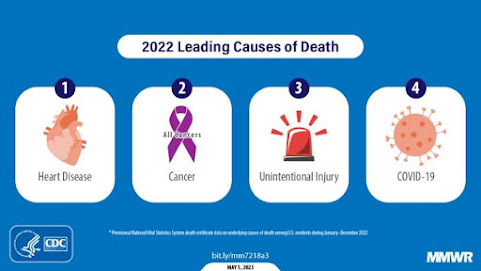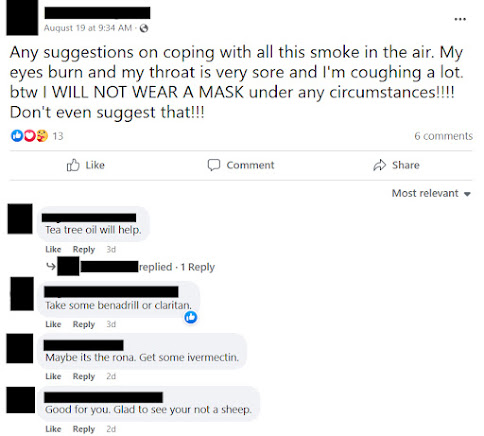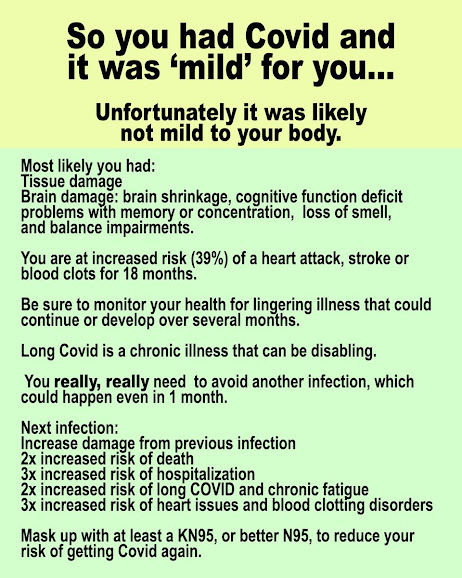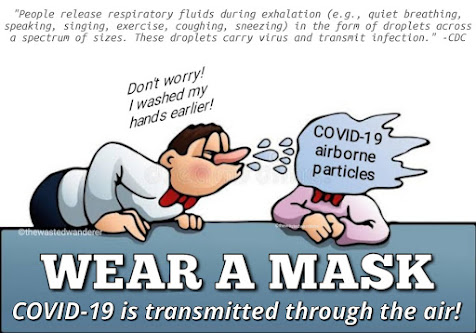Lots of people still don't quite understand how Covid spreads or how serious it is, causing mass disabilities and continuing to cause significantly more deaths that traffic collisions, although traffic collisions plus drug overdoses and other accidents have edged their way into third place. However, the accuracy of that is questionable as Covid isn't always noted specifically as an underlying cause anymore (like in a 30-year-old who died from a heart attack).
I have some friends who automatically mask around others, and some who will wear one if asked, and some who are kind enough to try to ignore the mask on my face despite no longer believing they're necessary. I'm very lucky to have no family or friends who deride or belittle me for continuing to take precautions during this ongoing pandemic. I know people who have ended relationships with loved ones, some getting divorced, because the people they care about refuse to take their concerns seriously, or are embarrassed that they still wear a mask in public, or have absolute contempt for people who are trying to avoid this virus.
It's amazing to see this divisiveness phenomenon right before our eyes!
People want this pandemic to be over so badly that most people seem to hear what they want to hear about it. We got excited that vaccines will save the day, but even though we knew, within six months of rollout, they will reduce severity of illness but not do enough to prevent transmission, we still called illness after vaccination a "breakthrough" infection with the bullshit connotation that it's unusual. Lots of people were pretty sure that kids wouldn't be affected by Covid, but many littles have been disabled by it or died (as many as 2,300 children in the US alone). In fact they provoke over 70% of the spread, which is why infections decrease in summer when kids are out of school. Then so many were flummoxed by the immunity debt narrative that wasn't remotely true but made some people very wary of continuing to wear a mask, hoping they'd get sick in order to prevent getting sick. And then the idea that we still just need to wash our hands really took hold despite all evidence that the virus is airborne and that the main guy running studies saying hand sanitizer prevents Covid owns a flippin' hand sanitizer company! And then some worry that masks will kill us with microplastics, even though plastics in our lungs aren't traced to masks (the biggest culprit is car tires and masks reduce inhalation of microplastics by 25 times). And then Dr. Moore, Canada's CMOH, said there will be no more masks mandates last December but advised people to continue to wear masks. And then the WHO said Covid is no longer an official emergency this past May, but, Dr Tedros' very next sentences were: "That does not mean Covid-19 is over as a global health threat. Last week, Covid-19 claimed a life every three minutes."
Part of the problem is definitely the government's nefarious intentions and public health comms and the media aiming for likes over truths. But another part of the problem is that people only listen to the parts they liked: the parts that made it sound like it's all over and masks don't work or are actually harmful because they really, really hate wearing them.
Covid has so many mutations at this point that it's unlikely we'll ever be able to get rid of it. That doesn't mean we'll eventually adjust to the levels of death or disability coming, but that we'll be destroyed by them. Adjusting to a virus means learning to avoid it. It's like adjusting to cars suddenly taking over the streets a century ago: people stopped walking on the streets and moved to the sides. People who intentionally stand in the way of moving vehicles are seen in need of help or education. It should be similar for people who intentionally stand in the way of pathogens in the air.
One of my friends who masks when asked was shocked that an entire family she knows got Covid after going to a funeral: "I didn't think things like that still happened!"
Yup. It's still happening in spades!
Another who masks when asked was about to have a gathering of elderly relatives over, so was being super careful, but also let her daughter go to a big sleepover the night before to spend the night with lots of other kids in close contact.
Yikes! Did she think because she knows the families that they couldn't have Covid?
I'm going to visit with a few friends I haven't seen in ages because they're not about masks much, and had this exchange when I warned them I'd be masking:
A: "Don't worry. I got vaccinated last week."
Me: "That's great! But vaccines don't do much to prevent the spread; they mainly reduce severity of acute infection."
B: "I've been testing diligently."
Me: "Tests have more false negative now, so it's hard to put much faith in them."
C: "I'm healthy!"
Me: "It's the 60% spread by people without any symptoms that's the kicker with this fucker!"
The pivotal question that I don't bother asking because I know the answer:
"Within the last 14 days, have you or anyone you live with been within six feet of someone outdoors that you don't live with or been inside any public building (stores, workplaces, etc.) without wearing a securely-fitting N95?"
If the answer to that were "no" from all of them, then I'd ditch the mask for an afternoon together. As it is, there'll be no eating or drinking for me! Even my friends who mask when asked only wear baggy blues.
If that seems like an unreasonable question to ask of anyone, consider that my entire family can say "no" to it, as can almost everyone in my social media Covid groups, and there are hundreds of us there getting much-needed support from one another. There are still lots of us who wear masks any time we're around people outside the people we live with. We're not hiding in our homes, but going to work and school and to the gym and out with friends. All those things are pretty much just as easy to do with a mask on.
Yet somehow, in all this mess, masks have become a dirty word.
I'm vaccinated too, but it's not the acute infection that worries me. It's Long Covid, and vaccines have little effect on that. I don't want my children's lives cut short by a perpetual illness or by having to take care of me, helping me eat and get to the bathroom for the years to come. A new study confirms that Long Covid is a significant risk even after a mild or asymptomatic case. They compared almost 140,000 people who tested positive for Covid in 2020 to almost six million people who haven't had Covid over a two year people. Out of 77 specific conditions provoked by Covid that they watched for, compared to people who have never had Covid, people not hospitalized were still at risk for over 31% of the conditions (heart attack, neurological issues, etc.) after two years, and people who were hospitalized for acute Covid were still at risk for 65% of them after two years. At two years post infection, people with Covid lost 80.4 of DALYs - disability-adjusted life years, per 1,000 people.
This is preventable, people!!
And the worst part is sitting on my hands saying nothing about the potential risks to people I know who have had Covid over and over, but think it's okay because it's been mild. It feels like a personal attack to explain what Covid can do to their bodies:
Here's a little ditty about handwashing.





2 comments:
While not being as rigorous as you are with masks there are some situations that are no-brainers. Who goes to see a doctor? Sick people. Who goes to an hospital? Sick people. Add any place or situation wherein people are densely packed such as on an airplane; someone will have a respiratory illness and do his or her best to spread it. When the risk is obvious, wear a mask.
Absolutely, there are places clearly more at risk for viruses than others. Although the reality that most cases are now asymptomatic, so people carry the virus while feeling perfectly healthy, makes risk-assessment trickier.
Post a Comment